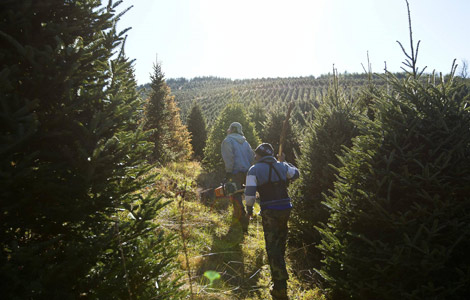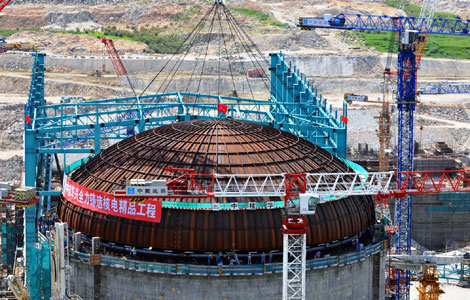Volunteers safeguard 'lake city'
Updated: 2012-12-29 08:55
By Xu Wei and Zhou Lihua in Wuhan (China Daily)
|
||||||||
![Ke Zhiqiang, a volunteer with Green Jiangcheng, an environmental non-governmental organization, retrieves a dead fish from a lake with the help of a colleague in Wuhan, Hubei province. [Gao Baoyan / for China Daily] Volunteers safeguard 'lake city'](../../attachement/jpg/site1/20121229/00221917dead12487fc702.jpg) |
|
Ke Zhiqiang, a volunteer with Green Jiangcheng, an environmental non-governmental organization, retrieves a dead fish from a lake with the help of a colleague in Wuhan, Hubei province. [Gao Baoyan / for China Daily] |
Authorities in Wuhan being helped in fight against pollution and reclamation
Ke Zhiqiang takes a stroll around East Lake in Wuhan every weekend, but it is not the fresh air or the exercise that draws him there.
Rather than taking in the scenery, his gaze is generally fixed on the lake's surface, on the lookout for trash, dead fish or anything else that shouldn't be there.
He is one of 40 volunteer guardians helping environmental authorities to protect the city's many lakes against new sources of pollution and illegal land reclamation projects.
"We act as a third eye for authorities," said the 38-year-old head of Green Jiangcheng, an environmental NGO that since 2009 has organized regular resident patrols around lakes.
"The volunteers are responsible for finding problems and collecting evidence," he explained. "We hand over what we find to the government as well as a local newspaper, which publicizes the problems."
While Wuhan is renowned for its 166 lakes, 38 of which are within the city's core 13 districts, it is also known for its many land reclamation projects.
The city has experienced two major periods of land reclamation, according to a 2012 report by four researchers at Huazhong University of Science and Technology in Wuhan, the capital of Hubei province.
One lasted from the 1950s - when there were 127 lakes in its downtown areas - to the early 1980s, when villagers were encouraged to turn the lakes into farmland or fisheries to meet the needs of the city's growing population.
The other was in the 1990s, when more than 330 hectares of land were claimed, mostly by real estate developers.
The authorities began their attempts to curb the activity in the late 1990s, with the first regulation on lake protection, and penalties for offenders coming in 2002. More than 20 regulations have since been introduced.
However, as land reclamation is cheaper than demolishing homes and relocating residents, even when fines are factored in, the motivation for development companies remains.
"Real estate along the lakes is generally sold at much higher prices than other properties," said Cheng Qi, 23, a volunteer guardian. "Compared with fines by authorities, the profits from a project are much more attractive."
The total area covered by the lakes in Wuhan fell from more than 6,000 hectares to about 5,330 hectares between 2000 and 2010, according to official data.
Efforts to stop the practice have also been hampered due to limited government resources and funding.
Wang Youguo, an investigator for Wuhan Water Authority, wrote in a newspaper article in June that his team has only about 300 members to cover all lakes and rivers.
"Some districts don't even have an inspection team, and only two districts of the core 13 have funding for such a purpose," he wrote.
This has made volunteers instrumental in accomplishing the mission.
The campaign to protect the lakes started in the early 2000s when residents would report anything untoward to authorities through hotlines and volunteers.
The city's environmental bureau officially began working with Ke's volunteer group in 2010 after seeing the impact it had made, largely due to the support of two newspapers and a news website, which ran weekly coverage of the lake campaign.
"Each of the drain outlets, and how construction companies put waste into the lakes, were made public. That's how the problem got noticed by the authorities," Ke said.
"We conducted firsthand investigations into the lakes, and had the facts to hand.
"We gave the media what we had and that's how the government felt pressure. The newspaper wanted the news. That's why they wanted to cooperate with us."
Meanwhile, volunteers used online instant messaging platforms to keep each other informed and to encourage more people to join in the weekly activities.
The role of the grassroots volunteers was formally recognized by the authorities in 2010, in a new regulation on lake renovation.
In June, the city government decided to hand responsibility for lake protection at each of the 38 lakes in the downtown areas to the deputy heads of districts or a legislator at the district people's congress, as official guardians of the lake.
The authorities also encouraged more volunteers to take up the role of grassroots guardians.
Ke was named the guardian of the city's East Lake and he has regularly met the official lake guardian to report any new findings.
"The channel of dialogue is open," he said. "If I found a problem and it was urgent, I would ring the hotline. If it wasn't, I would collect the proof and develop it in a report before presenting it.
"Although the grassroots level can notice problems that authorities usually can't, the problems can only be solved by the authorities," he said.
In July, the lake guardians held talks with Hu Lishan, the vice-mayor of Wuhan, in a TV broadcast at which they listed 10 new problems yet to be solved.
In October, Hu reported progress on the 10 problems to the grassroots guardians and pledged that the government will continue to support their campaign to protect the lakes in future.
Feng Yongfeng, the founder of an environmental protection NGO in Beijing, said he believes the volunteer effort in Wuhan could be replicated in other cities.
"The Wuhan case shows that grassroots environmental groups are needed to research problems, seek ways to solve them, and bring issues to the attention of the authorities who can help supervise them," he said.
"Some NGOs are only focused on empty talk to educate the public. More often than not, the public has more of a right to educate them," he said.
Despite the progress on lake protection over the years in Wuhan, Feng still warns there has been too much attention on pollution or land reclamation, while the restoration of the lakes' ecological systems has been neglected.
"There were a number of cases of illegal hunting of birds around the lakes this year and no volunteers seemed to have intervened," he said.
Ke said the volunteers are now planning to further expand their attention to the lakes in the city's suburban areas.
"My wish is simple. I hope I can still walk around any one of these lakes when I am old," he said.
"Our wish is to make sure that all these lakes are still here 100 years from now."











